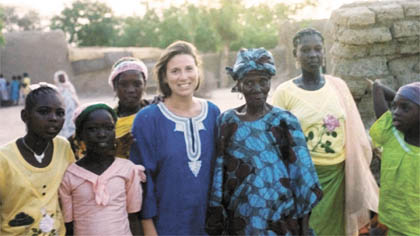
What It Takes to Be a Highly Effective Volunteer
Volunteering Overseas
What It Takes to Be a Highly Effective Volunteer
By Joseph Collins and Luke Wendt
During the research for How to Live Your Dream of Volunteering Overseas, a six-year project that took us to more than 25 countries, we spoke with a variety of people in the field of international volunteering. When we asked them "what are the character traits of a highly effective volunteer?" it became clear to us that, though there are a myriad of different approaches to volunteering, there seems to be a consensus around the most important traits of effective volunteers: flexibility, patience, openness, dependability, and humility.
Flexibility
You must be flexible. You may arrive at a volunteer post with a written job description, but when it comes time to start doing things you may discover that your job description is largely irrelevant. No volunteer ever knows exactly what will be required of him or her in the workplace, but, as Lee Cridland of the Andean Information Center in Bolivia told us, "Being a good volunteer is about doing what is necessary."
Doing what is necessary often means letting go of grandiose plans and undertaking basic tasks. Ranjit Purshotan of the Legal Resource Center in South Africa explained, "It’s actually impossible to find exciting, high-profile work for volunteers every day. At some point you have to do the run-of-the-mill stuff. Fighting for someone's old age pension, for example, may not seem exciting at first, but it's of the utmost importance to that person." Being flexible involves adapting to what is going on around you, even if it is radically different than what you are used to.
Patience
International volunteers must learn to be patient and go slowly. Almost everyone we interviewed noted that the pace of life in Asia, Africa, and Latin America is slower than back home. Tom Benevento, with Brethren Volunteer Service in Guatemala, suggested that you "focus on the process rather than the successes, and try not to do too much."
In many countries when people say they will meet you at a certain time you can expect them to be late or not arrive at all. Frequently, punctuality is not always highly valued, and this can be a great test of a volunteer’s patience.
People in Asia, Africa, and Latin America can also be much less project oriented than their North American counterparts. Volunteers must realize that meaningful community development is a long and slow process. We were asked repeatedly, by volunteers and hosts alike, to advise future volunteers to "avoid forcing their agenda" and to "let things develop at their own pace." Many projects proceed much more slowly than they would in North America. A community organization in Haiti, for example, may lack computers, phones, and even electricity. In Nepal, some villages may be accessible only on foot. All of these things can slow down a project, and patience is necessary.
Openness
"Volunteers should either have a really open worldview or have a willingness to have their worldview opened. Don’t be afraid to acknowledge your prejudices. If you think that you do not have any, then you are pretty naïve." —Mary Helen Richter, Volunteer, Mennonite Central Committee, Vietnam.
Respect and tolerance are essential for international volunteers. You will be going into situations that you will not understand right away. Be careful not to judge too quickly. Be willing to see things through others’ eyes. You may have the opportunity to do things you would never do at home: drink yak butter tea, make a fool of yourself dancing in public, attend a traditional healing ceremony. Take the chance.
Dependability
We interviewed hosts who felt they had wasted time orienting, supervising, and befriending international volunteers who ended up abandoning posts, taking holidays whenever they wanted, or just hanging around doing no work at all. Volunteers should not abuse the hospitality and warmth of their hosts. Follow through with your commitments and respect the time and energy of your host organization and host community.
Humility
International volunteers have a unique opportunity to find out how little they know. In situations where the language is unfamiliar, the rules are new, and the culture is different, volunteers are often reduced to feeling childish. Some realize that, while they may be accomplished professionals and community leaders at home, in their new environment they are novices. Often volunteers have to ask a lot of questions and carefully observe their surroundings in order to accomplish even the most basic tasks. Fighting your occasional feelings of helplessness with stubbornness and pride will invariably lead to frustration and conflict.
Humility does not come easily to many volunteers. One simple exercise that you might consider completing while in the field is a life-experience assessment. Look around at the people with whom you are living and working and ask yourself a few simple questions:
Life Experience Assessment
• What knowledge and skills do the people from this community possess that I do not?
• What life experiences do they have which are different from mine?
• What are some of the obstacles they have had to overcome in their lives?
• What challenges do they face daily that I do not?
• What are some of their personal and professional strengths?
• What can I learn from them?
These questions can help you humble yourself and temper some of the arrogance and frustration that so easily impair the effectiveness and sense of accomplishment of many volunteers. They can also assist you in the process of opening yourself to what Kelly Reineke, who volunteered in Brazil, calls "two-way empowerment," learning from and being changed by the people you intended to help.
